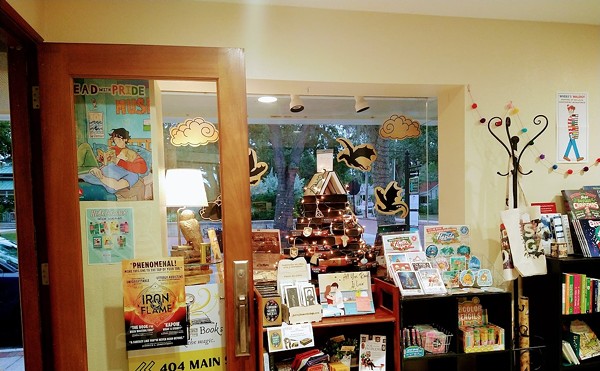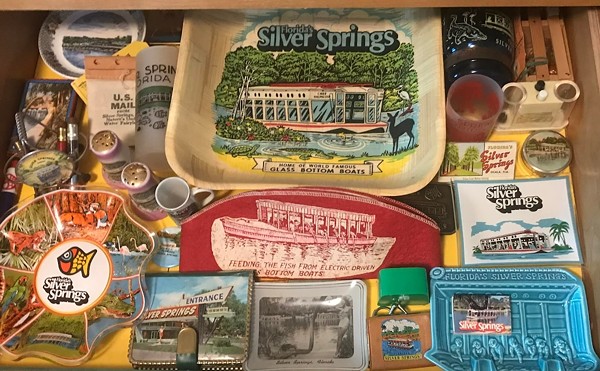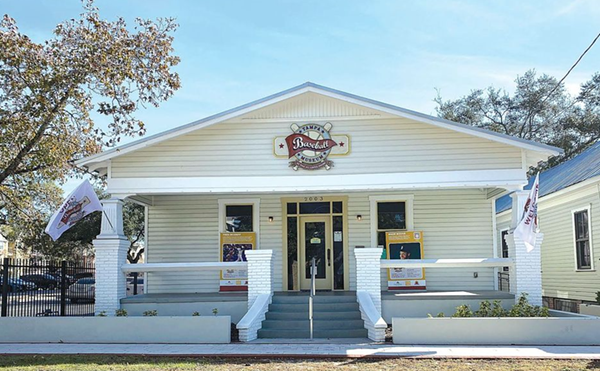That other play is simply brilliant; this one is, finally, annoying. Seldom have so many thematic opportunities been so wasted.
When Baby begins, Anna (Burns) is pregnant thanks to friend Peter’s (Jenkins) willingness to inseminate her in the traditional manner. The intention is to provide Anna and her lover Ruth (Rothert) with a child, and by most indications, this threesome-of-convenience is nicely sturdy. But there are also three problems – imaginary children Orphan, Henri and Cecil (the first two played by Rothert, the third by Burns). These creatures of fantasy have rudimentary personalities and even histories: Orphan was raised by dogs, for example, and Henri is a French child inspired by the film The Red Balloon.
What seems to have started as a pleasant diversion has become a crisis: more and more Anna and especially Ruth are playing the parts of the fantasy kids, and it’s getting difficult to carry on an adult conversation without someone slipping into infant mode. Further, there’s the challenge of the real baby growing in Anna’s womb: maybe it’s time, all things considered, that the notional rugrats bit the dust. But can Anna and Ruth bear to give up their imaginary friends? Will little Henri, for example, agree to stand out on the fire escape until balloons can carry him away forever?
If this sounds cute, well, for a while it is, and then the sameness just wears you down. If it sounds meaningful, believe me, it’s not. All the subjects that would appear to be invoked – parenthood, reality/fantasy, lesbianism, the burden of adult responsibility – are never examined, and we’re never even allowed to feel what kind of emptiness led Anna and Ruth to invent these specters in the first place. Of course, the obvious comparison is with the imaginary child in Edward Albee’s Who’s Afraid of Virginia Woolf? – but whereas that kid stood at the center of George and Martha’s anguished relationship with the real world, the tykes in Baby don’t stand for much besides an inviting escape from being Ruth and Anna.
There are other problems besides: why do the women quote and misquote from famous plays like professors of dramatic literature? Why is Peter – who’s presumably gay – without a relationship of his own, and why does rabies, of all things, turn up repeatedly as a leitmotif? True, there’s an unusually eloquent speech near the end of the play, when Ruth confesses her despair at not having been able to merge her DNA with Anna’s, but the whole play should be made up of such speeches, and it isn’t. As for the surprise ending, it’s not.
Still, the actors are charming. As pregnant Anna, Alison Burns is the more sensible woman (when her hormones aren’t driving her and the other characters crazy), and Rothert as Ruth is persuasively the female whose hold on reality is the more tenuous. Jenkins as Peter is engaging and likable, courageously holding himself back when you just know that he’d like to unleash some comic wildness. Scott Cooper’s set is only moderately attractive: it’s a living room and minimal kitchenette backed with dozens of empty picture frames (a nice touch), and Hartley’s lighting is, as usual, impeccable. The uncredited sound design features an eclectic group of women singers.
But it adds up to very little. There’s material for a great play here, about gay couples, about trading fantasies for realities, about “growing up” in several senses of the phrase. But it doesn’t happen. The play betrays its own potential. And not even the few laughs it offers can make us ignore that sad fact.
And Baby Makes Seven
Tampa Bay Performing Arts Center, 1010 N. MacInnes Place, Tampa, 813-229-STAR. Runs through Oct. 11, 8 p.m Thursdays-Saturdays, 4 p.m. Sundays. $24.50. Rating: Two-and-a-half stars
















